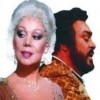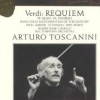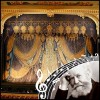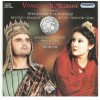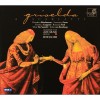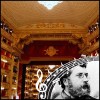歌剧剧本
La forza del destino (The Force of Destiny) is an Italian opera by Giuseppe Verdi. The libretto was written by Francesco Maria Piave based on a Spanish drama, Don Álvaro, o La fuerza del sino (1835), by Ángel de Saavedra, Duke of Rivas, with a scene adapted from Friedrich Schiller's Wallensteins Lager. It was first performed in the Bolshoi Kamenny Theatre of St. Petersburg, Russia, on 10 November 1862.
After some further revisions, performances in Rome in 1863 (as Don Alvaro) and Madrid (with the Duke of Rivas, the play's author, in attendance) followed shortly afterwards, and the opera subsequently travelled to New York and Vienna (1865), Buenos Aires (1866) and London (1867).
Verdi made other revisions, with additions by Antonio Ghislanzoni. This version, which premiered at La Scala, Milan, on 27 February 1869, has become the "standard" performance version. The most important changes were a new overture (replacing a brief prelude); the addition of a final scene to Act 3, following the duel between Carlo and Alvaro; and a new ending, in which Alvaro remains alive, instead of throwing himself off a cliff to his death.
Act 1
The mansion of Leonora's family, in Seville
Don Alvaro is a young nobleman from South America (presumably Peru) who is part Indian and who has settled in Seville, where, however, he is not very well thought of. He falls in love with Donna Leonora, the daughter of the Marquis of Calatrava, who, notwithstanding his love for his daughter, is determined that she shall marry only a man of the highest origin. Leonora, knowing her father’s aversion to and deeply in love with Alvaro, determines to give up her home and country in order to elope with him, aided by her confidante, Curra.(Me pellegrina ed orfana - "Exiled and orphaned far from my childhood home").
Her father unexpectedly enters and discovers Alvaro; he threatens him with death, and, in order to remove any suspicion as to Leonora’s purity, Alvaro offers to surrender himself to the Marquis. He flings down his pistol which goes off and mortally wounds the Marquis who dies cursing his daughter.
Act 2
Scene 1: An inn in the village of Hornachuelos
The Alcalde, several peasant muleteers, and Don Carlo of Vargas, the brother of Doña Leonora, are gathered in the kitchen of an inn. Don Carlo, disguised as a student of Salamanca, under the fictitious name of Pereda, is seeking revenge against Alvaro and Leonora (Son Pereda son ricco d'onore - "I am Pereda, of honorable descent"). During the supper, Preziosilla, a young gypsy, tells the young men’s fortunes and exhorts them to enlist in the war (Al suon del tamburo - "When side drums rattle") for Italy’s freedom, which all agree to do. Having become separated from Alvaro, Leonora arrives in male attire, but slips away without being discovered by Carlo.
Scene 2: A monastery nearby
Leonora takes refuge in the monastery (Sono giunta! ... Madre, pietosa Vergine - "I've got here! Oh, thank God!") where she tells the abbot, Padre Guardiano, her true name and that she intends to spend the remainder of her life in a hermitage. The abbot recounts the trials she will have to undergo. Leonora, Padre Guardiano, Fra Melitone, and the other monks join in prayer.
Act 3
Scene 1: A forest near Velletri, in Italy
Meanwhile Don Alvaro has joined the Spanish army under the name of Don Federico Herreros (La vita è inferno ... O tu che in seno agli angeli - "Life is a hell to those who are unhappy....Oh, my beloved, risen among the angels"). One night he saves the life of Don Carlo who is serving in the same army under the name of Don Felix Bornos. They become close friends and go into battle side by side.
Scene 2: The officers' quarters
In one of these engagements Don Alvaro is, as he supposes, mortally wounded, and confides to Don Carlo’s care a valise containing a bundle of letters which he is to destroy as soon as Don Alvaro dies. (Solenne in quest'ora - "Swear to me, in this solemn hour"). Don Carlo has sworn not to look at the contents of the letters; but he becomes suspicious of his friend. (Morir! Tremenda cosa! ... Urna fatale del mio destino - "To die! What an awesome thought...Get away, fatal lot sent to my Destiny!"). He opens the valise, finds his sister’s picture, and realizes Alvaro's true identity. At that moment a surgeon brings word that Don Alvaro may recover. Don Carlo is overjoyed at the idea of avenging his father’s death.
Scene 3: A camp near the battleground
Alvaro, having recovered, is confronted by Carlo. They begin to duel but are pulled away from each other by the soldiers. As they restrain Carlo, the anguished Don Alvaro vows to enter a monastery.
The soldiers gather. Trabucco, the peddler, tries to sell them his wares; Fra Melitone chastises them for their godless ways; and Preziosilla leads them in a chorus in praise of the military life (Rataplan, rataplan, della gloria - "Rum-tum-tum on the drum is the music that makes a soldier's martial spirit rise").
Act 4
Scene 1: The monastery
Don Alvaro has entered the monastery at Hornachuelos, near which is Leonora’s cave, under the name of Father Raphael. Don Carlo arrives and forces him to fight (Le minacci, i fieri accenti - "May the winds carry off with them").
Scene 2: A desolate spot near Leonora's hermitage
Leonora prays that she may find peace in death (Pace, pace mio Dio! - "Peace, O mighty Father, give me peace!"). Alvaro runs in, calling for help, having mortally wounded Carlo in their duel. The two lovers recognize each other. Leonora runs offstage to see her brother, who, when she bends over him, stabs her to the heart. Leonora returns with Padre Guardiano; he and Alvaro pray to heaven as she dies.








